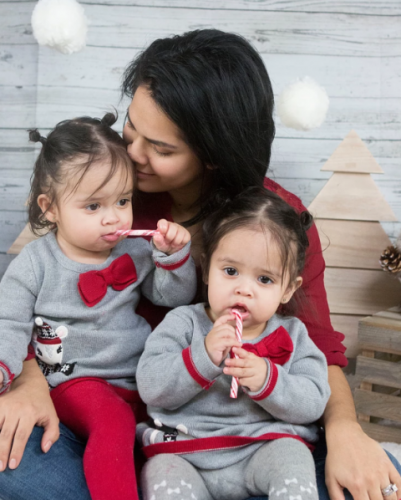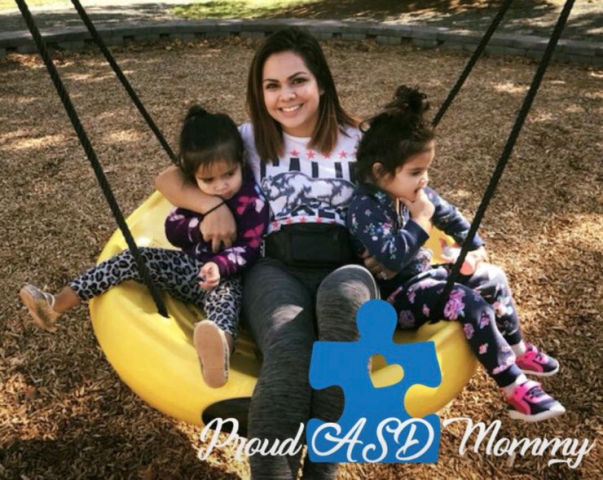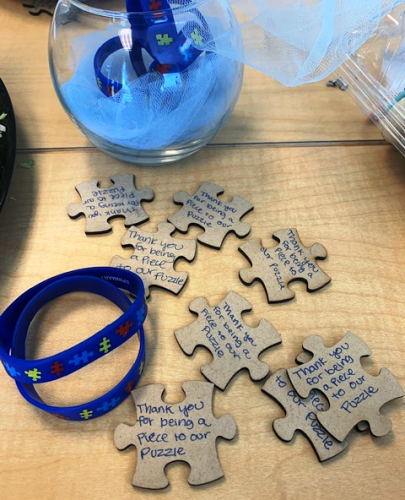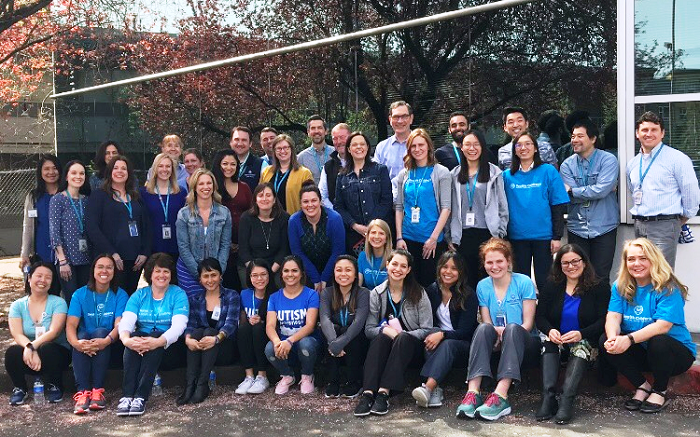 In honor of Autism Awareness Month, On the Pulse shares a story about a mother with 3-year-old twin daughters who have autism and her showing of gratitude for the relentless care and support that the Seattle Children’s Autism Center staff has provided her family.
In honor of Autism Awareness Month, On the Pulse shares a story about a mother with 3-year-old twin daughters who have autism and her showing of gratitude for the relentless care and support that the Seattle Children’s Autism Center staff has provided her family.
Nataly Cuzcueta felt like a proud parent when she witnessed her twin daughters, Kira and Aliya, smile, laugh and walk for the first time.
Seeing them reach these milestones left no doubt in Cuzcueta’s mind that their development was right on track.
However, when her daughters turned 11 months old, everything changed.

“I noticed their development began to regress,” said Cuzcueta. “The girls went from walking, back to crawling, and were no longer engaging verbally or making eye contact.”
Cuzcueta’s mind flooded with worry, so she decided to contact a pediatrician to get Kira and Aliya evaluated.
“They began receiving treatment for developmental delays, yet no one suspected it was anything else,” said Cuzcueta.
Kira and Aliya’s behavior continued to worsen at a rapid pace to the point that they were physically harming themselves.
“The girls were having intense tantrums and would bang their heads on walls,” said Cuzcueta. “They were frustrated because they were not able to communicate. I felt hopeless and alone because I didn’t know what to do.”
Yet Cuzcueta was determined to get the help her daughters desperately needed.
“I had a feeling that this was more than just a developmental delay,” said Cuzcueta. “It was then that I decided to contact Seattle Children’s Autism Center.”
A mother’s intuition leads to a diagnosis

Not only did the Autism Center help diagnose Kira and Aliya with autism spectrum disorder (ASD), they provided Cuzcueta with a sense of relief that slowly helped to lift the weight of hopelessness off her shoulders.
“They offered emotional support and helped me to understand the reality of my daughters’ situation,” said Cuzcueta. “They gave me hope that I thought I had lost.”
The treatment that the girls received came in the form of an intensive 12-week treatment called the Early Intervention Program (EIP).
Dr. Mendy Minjarez, clinic director at the Autism Center who leads the program, said it offers the resources needed to help children, up to the age of 6, in their life progression so they are able to reach key milestones like entering daycare or going to school. The EIP focuses on helping children develop communication skills and reduce behavioral problems.
“Since the program began in 2015, an average of 97% of children who began with minimal ability to communicate have graduated being able to get a caregiver’s attention and request objects or help by the end of the three-month session,” said Minjarez.
During the program, Cuzcueta began seeing changes in Kira and Aliya’s behavior.
“They learned new skills while I received help in making day-to-day living feel more manageable for the girls,” said Cuzcueta. “They now have the ability to eat at a table and their self-harming behavior has significantly decreased. They also learned how to point as a form of communication. These were all huge game changers.”
“Thank you for being a piece to our puzzle”

To further their progress, Kira and Aliya are currently receiving treatment through the Autism Center’s Biobehavioral Program. With guidance from psychologists, Dr. Eric Boelter, clinical supervisor of the program, and Dr. Yaniz Padilla, the girls are continuing to learn skills to decrease their self-harming behavior.
“It’s still a struggle, but with the support from the team at the Autism Center, I’ve learned a lot and feel more confident as a parent,” said Cuzcueta. “I couldn’t be more grateful to everyone who has helped my girls and I get to where we are now. Each person has added a piece to the puzzle in helping us understand the complexity of autism.”
Eager to find a way to show her appreciation for the staff at the Autism Center who transformed her feelings of helplessness to hope, Cuzcueta spent two months working on a project to give thanks to them as well as spread awareness about autism within the larger community.

“I began a fundraiser for Autism Awareness Month to give back to the staff for all their continued help, not just from my family, but on behalf of other families that I am now connected to who have had life-changing success because of the center,” said Cuzcueta. “We decided to cater a lunch for the staff and give away ‘Autism Awareness’ bracelets and t-shirts with the names of the local businesses that donated to the project, so that each staff member could have something to keep as a representation of the support of the entire community.”
On April 2, which is World Autism Awareness Day, Cuzcueta not only surprised the staff with a table filled with sandwiches and cookies, but a special video she created showing Kira and Aliya’s journey interwoven with messages thanking all of those at the center who stood by her family through many difficult times.
Brightness filled the room as the video played and staff sat quietly in awe of progress that Kira and Aliya made over time.

“Thank you so much for this wonderful surprise for our team,” said Minjarez to Cuzcueta during the event. “Kira and Aliya are so lucky to have a mother like you who truly cares and strives to give them the best life possible.”
While the future isn’t clear for her daughters, Cuzcueta continues to learn as much as she can to give them a chance at a normal life, while also channeling her energy as an advocate for autism.
“Having children with autism has been the most eye-opening and heart-wrenching journey, and it has taught me more about love and compassion than I could have ever imagined,” said Cuzcueta. “They are my light and my everything. I can’t wait to see them thrive and flourish.”
Funding for autism access, care, resources and research are key priorities of It Starts With Yes: The Campaign for Seattle Children’s and our efforts to more effectively diagnose and treat a wide range of brain health conditions.
Our Early Intervention Program is an intensive outpatient program for kids up to age 6 who have significant communication and behavioral challenges. It is also unique in that it delivers extensive education to parents, helping them communicate with their children and empowering them to be advocates. Philanthropy allows us to continue and expand this transformative program, changing the course of a child’s life.
Give today to help support kids like Kira and Aliya and transform childhood health for generations to come.

